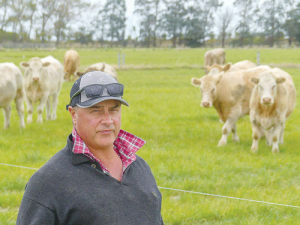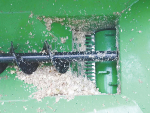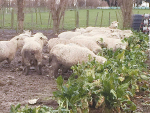Fodder beet has dramatically changed the beef industry, says Brent Fisher of the Silverstream Charolais stud, Greenpark.
Fisher is sending animals as young as 15 months to the works, at carcase weights previously attained at 30 months.
“It’s been a massive change,” he says.
Fisher was an early adopter of fodder beet in beef production, introducing it about five years ago primarily for winter grazing.
He said he recently toured six or seven beef properties and found nearly all are now using a fodder beet system “with amazing results”.
“If you do everything right there’s nothing to be afraid of.”
Fisher said New Zealand’s traditional beef rearing system saw calves “battle though” two winters before finally being fattened up enough to go to the works “providing everything goes all right”.
It is a very long process. However, with fodder beet they have really good growth rates through the winter.
“We can put on about 2500kg liveweight gain per hectare on our fodder beet crops.
“That springboards those cattle into the spring.
“So we’re now killing cattle at about 300kg carcase weight from about 15 months of age, which is absolutely unheard of.”
Fisher said fodder beet fits well into the NZ system because it allows farmers to utilise the spring grass growth curve.
“Unless you can winter a lot of animals you’ve never got enough come the spring to take advantage of it.”
Fodder beet allows him to run a lot of cattle on a small area.
“Then when the spring comes and the grass starts to grow you’ve got the animals there to utilise your grass. You keep the ME good in your grass and if you’ve got good ME you’ll get good growth rates in your cattle.”
It makes the industry as a whole more efficient, said Fisher.
“The people who are fattening, because they can fatten them faster can afford to pay more for the calves from the fellow who’s been the breeder. And over the years the breeding cow numbers have been sliding and sliding because they haven’t been getting paid enough... because the fattening system was so inefficient.”
The facts
- Silverstream consists of two properties: one on the flat adjacent to Lake Ellesmere/Waihora and one nearby in the Port Hills, totalling 900ha.
- They fatten about 1000 cattle a year and calve about 300 stud cows -- Charolais and Hereford. They winter about 2000 cattle and run about 1000 breeding ewes.
Not for everyone
Brent Fisher says fodder beet does not necessarily suit everyone.
“If you don’t do things right the potential for things to go bad is quite high. But it’s like someone being let loose with grain or anything: if you’ve got poor management you’ll have major problems, no question,” he explains.
“The critical thing is to make sure you’ve got your 10-in-1 up to date, that your trace elements in your animals are right, and that you transition the animals onto the beet in the correct fashion.”
Fisher says the clostridial-type problems tackled by the 10-in-1 vaccination seem to be exacerbated in fodder beet. There is “a good chance you’ll bowl a few” if the vaccination is not up to date, but the vaccination itself is cheap.
Silverstream also administered copper and selenium bullets because of known deficiencies in the soil.
Fisher transitions the animals onto beet according to the now-standard gradual transition protocols to avoid acidosis.
But beef cattle rarely have the same phosphorus deficiency problems as lactating dairy cows, and Fisher uses no DCP on the farm.



















